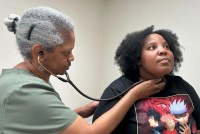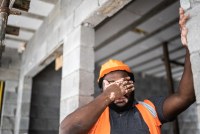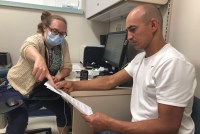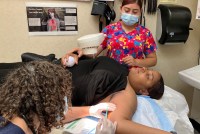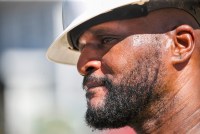Latest KFF Health News Stories
A Decades-Long Drop in Teen Births Is Slowing, and Advocates Worry a Reversal Is Coming
After three decades of declines in teen pregnancies, data shows the rates are starting to plateau. The reversal of “Roe v. Wade,” coupled with efforts to suspend sex education in schools and higher rates of youth mental health issues post-pandemic, could culminate in a perfect storm.
As Younger Children Increasingly Die by Suicide, Better Tracking and Prevention Is Sought
Decades-long systemic shortcomings have left suicide among children ages 5 to 11 poorly tracked and addressed. Now, as rates appear to be rising, advocates are strengthening efforts to screen for problems and prevent deaths in younger children.
Con cambios en Medicaid, residentes de zonas rurales se sienten abandonados a su suerte
En las zonas rurales, la falta de acceso a navegadores, las personas que ayudan a los beneficiarios de Medicaid a mantener su cobertura o encontrar otro seguro si ya no reúnen los requisitos, podría agravar estas dificultades.
How Will Rural Americans Fare During Medicaid Unwinding? Experts Fear They’re on Their Own
As states review their Medicaid rolls after the expiration of a pandemic-era prohibition against kicking recipients off the government insurance program, experts say the lack of help available to rural Americans in navigating insurance options puts them at greater risk of losing health coverage than people in metropolitan areas.
With Its Two Doctors Planning to Retire, an Alabama Town Patches Together Health Care Options
LaFayette and other rural areas of the country tend to have high rates of health problems but not enough doctors. Many are adapting by investing in nontraditional prevention and treatment options.
Sin mantas, peluches, ni en brazos de sus padres: cómo hacer que los bebés duerman seguros
Algunas advertencias claras: los bebés no deben dormir con mantas, peluches o protectores que puedan provocar asfixia o estrangulamiento. Tampoco en brazos de los padres.
Cozy Images of Plush Toys and Blankets Counter Messaging on Safe Infant Sleep
Unsafe sleep environments are among the main reasons accidental suffocation or strangulation is a hard-to-solve public health problem.
No existen normas federales para proteger a los trabajadores cuando los días son excesivamente calurosos. Y sin el apoyo bipartidista del Congreso, incluso con la atención urgente de la administración Biden, es posible que el alivio no llegue en años.
Workers Pay the Price While Congress and Employers Debate Need for Heat Regulations
Studies suggest official numbers vastly underestimate heat-related injuries and illness on the job. To institute protections, the government must calculate their cost — and the cost of inaction.
When Temps Rise, So Do Medical Risks. Should Doctors and Nurses Talk More About Heat?
The medical dangers of heat are real. But people often ignore public heat alerts or don’t realize how vulnerable they are. A new alert system prompts clinicians to talk about heat with patients.
Californians Headed to HBCUs in the South Prepare for College Under Abortion Bans
As high school graduates prepare to leave states like California that protect abortion rights for historically Black colleges in states where abortion is banned, they’re getting ready to safeguard their reproductive health during college.
More Cities Address ‘Shade Deserts’ as Extreme Heat Triggers Health Issues
Where trees are growing — and who has access to their shade — affects health and well-being, especially in one of the hottest states in the country.
What the Health? From KFF Health News: A Not-So-Health-y GOP Debate
The first Republican presidential debate of the 2024 cycle took place without front-runner Donald Trump — and with hardly a mention of health issues save for abortion. Meanwhile, in Florida, patients dropped from the Medicaid program are suing the state for not giving them enough notice or a way to contest their being dropped from the program. Margot Sanger-Katz of The New York Times, Joanne Kenen of the Johns Hopkins Bloomberg School of Public Health and Politico, and Victoria Knight of Axios join KFF Health News’ Julie Rovner to discuss these issues and more. Plus, for “extra credit,” the panelists suggest health policy stories they read this week they think you should read, too.
Dangers and Deaths Around Black Pregnancies Seen as a ‘Completely Preventable’ Health Crisis
Studies show that high rates of Black fetal and infant deaths are largely preventable — and part of systemic failures that contribute to disproportionately high Black maternal mortality rates.
The Painful Pandemic Lessons Mandy Cohen Carries to the CDC
Mandy Cohen, the new director of the Centers for Disease Control and Prevention, earned praise for her leadership and communication as the face of North Carolina’s response to covid-19. People in the state’s most vulnerable communities tell a more complicated story.
Feds Say Hospitals That Redistribute Medicaid Money Violate Law
Federal officials are trying to clamp down on private arrangements among some hospitals to pay themselves back for the Medicaid taxes they’ve paid. State health officials and the influential hospital industry argue that regulators have no jurisdiction over the agreements.
Parents See Own Health Spiral as Their Kids’ Mental Illnesses Worsen
The day-to-day struggles that parents of kids with mental health conditions must navigate have led to their own crisis: The stress can take a physical toll that disrupts parents’ ability to provide care, say psychologists, researchers, and advocates for families.
What the Health? From KFF Health News: On Abortion Rights, Ohio Is the New Kansas
Nearly a year to the day after Kansas voters surprised the nation by defeating an anti-abortion ballot question, Ohio voters defeated a similar, if cagier, effort to limit access in that state. This week, they rejected an effort to raise the threshold for approval of future ballot measures from a simple majority, which would have made it harder to protect abortion access with yet another ballot question come November. Meanwhile, the number of Americans without health insurance has dropped to an all-time low, though few noticed. Joanne Kenen of the Johns Hopkins Bloomberg School of Public Health and Politico, Rachel Roubein of The Washington Post, and Emmarie Huetteman of KFF Health News join KFF Health News’ chief Washington correspondent, Julie Rovner, to discuss these issues and more. Also this week, Rovner interviews Kate McEvoy, executive director of the National Association of Medicaid Directors, about how the “Medicaid unwinding” is going, as millions have their eligibility for coverage rechecked.
How the Texas Trial Changed the Story of Abortion Rights in America
Stark, plaintive testimony from women denied abortion care represents the start of “the 50-year fight to get rid of Dobbs,” one historian says.
As Water Reuse Expands, Proponents Battle the ‘Yuck’ Factor
As drought and climate change threaten water supplies, municipalities around the country are ramping up water reuse efforts. But they have to overcome the “yuk” factor.






